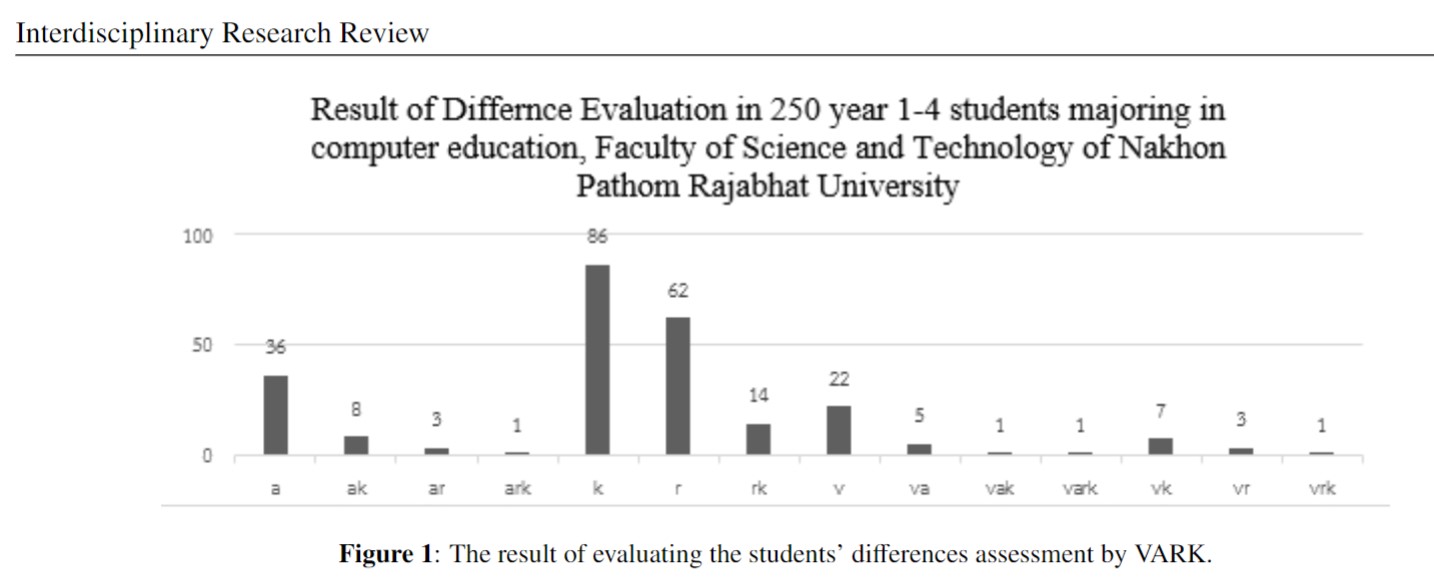Interactive online learning development by learners’ dominant aptitude result of VARK in computer–based learning and teaching course for computer education students
Main Article Content
Abstract
The objectives of this research are to: 1) develop an interactive online learning by learners’ dominant aptitude result of VARK in Computer–based Learning and Teaching Course for computer education students; 2) identify the effectiveness of interactive online learning media; 3) compare the learners’ performance after receiving the treatment; and 4) find learners’ satisfaction after receiving the treatment. The sample of this research is 26 3–year undergraduates of Nakhon Pathom Rajabhat University who enrolled in Computer–based Learning and Teaching Course in semester 2/2020, derived by cluster random sampling. The treatment of this research is the effectiveness of interactive online learning media development by learners’ dominant aptitude result of VARK, and the research tools are a learning achievement test and a satisfaction test. The statistics used are percentage, average, standard deviation, and dependent t–test.
This research found that:
1) The media of the interactive online learning by learners’ dominant aptitude result of VARK in Computer–based Learning
and Teaching Course consists of 4 units: design of computer instruction, development of learning management on a cloud
computing system, design of individual learning presented with a video demonstration, and filming and editing technique a
video demonstration.
2) The effectiveness of media had been improved at E1/E2 or equal 81.41/80.22, which the maximum value is greater than
the research standard at 80/80.
3) The learners’ performance after learning with the interactive online learning by learners’ dominant aptitude result of
VARK is higher than that before learning at .05 level.
4) The learners’ satisfaction after learning with the interactive online learning by learners’ dominant aptitude result of VARK
is at the highest satisfaction level.
Article Details

This work is licensed under a Creative Commons Attribution-NonCommercial-NoDerivatives 4.0 International License.
References
Ministry of education. Rajabhat University Act, 2004. http://www.moe.go.th/moe/nipa/ed law p.r.g.edu7.pdf. (2017).
Ministry of education. National Education Act, 1999. http://www.moe.go.th/moe/nipa/ed law/p.r.g.edu1.pdf.(2017).
E. Bangthamai. “The Development of Instructional Activities Model by Problem Based Learning to Enhance Problem Solving Abilities on Digital Photography Course for Undergraduate Students Faculty of Education, Silpakorn University.” Veridian E–Journal, Silpakorn University. (2018).
N. Fleming, VARK classification of Learning Styles. London: Educational: SEDA, (2008).
P. Roungrong, Computer Assisted Instruction. Bangkok: Phonthicha, (2016).
M. Tiantong, Courseware design and development for computer instruction. Bangkok: King Mongkut’s Institution of Technology North Bangkok, (2005).
M. Tiantong, Courseware design and development for CAI. Bangkok: King Mongkut’s University of Technology North Bangkok, (2011).
U. Srichailard, K. Sinthanakul. “The Development of WebBased Instruction on A Learning Management System for A Competency-Based Lesson Plan with Blended Learning and MIAP Process for A Computer Graphics and Animation Course.” Journal of Industrial Education 16 3 (2017) 83–91.
S. Siksen, N. Phumeechanya, S. Laisema. “The Development of System and Collaborative Learning Activities in Ubiquitous Learning Environments Using Computer Tablet with QR Code.” Veridian E–Journal, Silpakorn University 11 5 (2018) 668–682.
J. Chawanapaisarn, P. Varasunun, S. Arunyanart. “The Development of Mathematics Achievement in Pythagorean Theorem by integrated STEM education of students in Mathayomsukasa 2 of Banglane Wittaya School.” Veridian E–Journal, Silpakorn University 10 1 (2017) 297–312.


